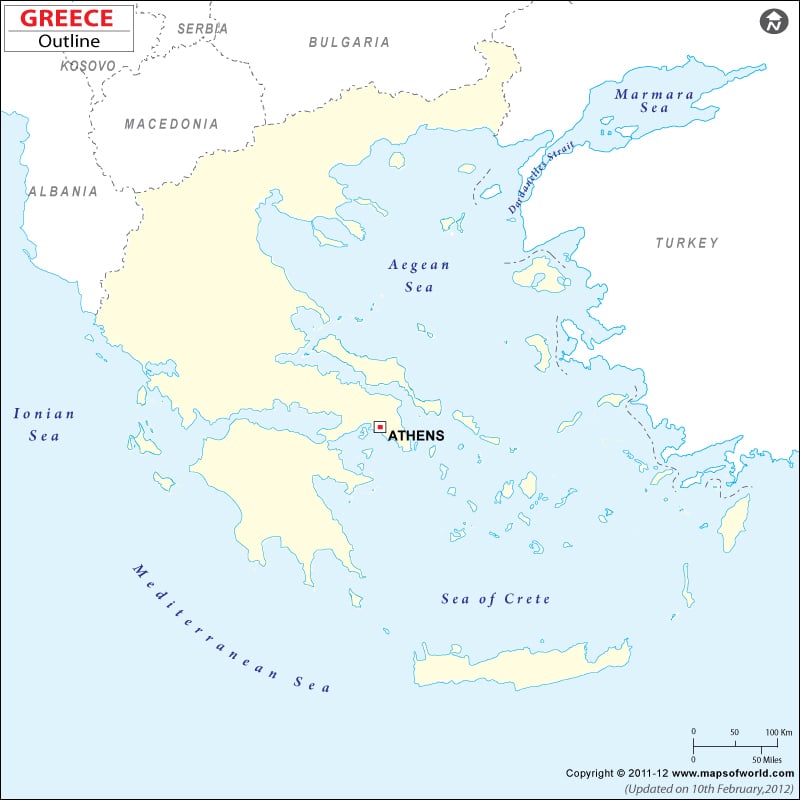- Greece Cities - Alaxandroupolis, Corinth, Heraklion, Ioannina, Kalamata, Kavala, Patra, Sparta, Thessaloniki, Volos
- Greece Regions - Attica, Central Greece, Crete, East Macedonia and Thrace, Epirus, Ionian Islands, Macedonia Central, Mount Athos, North Aegean, Peloponnese, South Aegean, Thessaly, West Greece, West Macedonia
- Neighboring Countries - Albania, Macedonia, Turkiye, Bulgaria
- Continent And Regions - Europe Map
- Other Greece Maps - Greece Map, Where is Greece, Greece Road Map, Greece Rail Map, Greece River Map, Greece Political Map, Greece Flag
Located in southern Europe, Greece is a beautiful country with an ancient culture, rich traditions, and a long, colorful history. The country is officially called the Hellenic Republic of Greece and is a member of the European Union since 1981 in terms of regional politics is considered to be part of Western Europe.
Historic Legacy
Greece is home to some of the earliest and most advanced human civilizations. The Bronze Age Minoan civilization flourished on the island of Crete. Although Crete is known to have been home to human settlement even as early as 800,000 BC, the Minoan Civilization became well-established in about 5000 BC. The Mycenaean Civilization flourished in Mycenae, and in the Peloponnesian peninsular region, from 1900 BC through 1100 BC. The civilization left a highly advanced cultural legacy and much of the Greek mythology and ancient Greek religion is derived from the civilization.
Ancient Greece was the greatest cultural influence on the western world. The city-states, the polis of Greece demonstrated a high level of administrative and thought culture. Democracy, oligarchy, and monarchy were defined in ancient Greece. The architecture and engineering of the times were highly advanced. Alexander the Great was the Greek prince of Macedon who went on to build the greatest empire of the times.
Later as part of the Byzantine Empire, the Ottoman Empire and the Venetian regime, Greek assimilated a range of influences that enriched the indigenous culture. After a protracted war, Greece gained independence from the Ottoman Empire in 1830. During World War I Greece played an important role due to its proximity to the Turkish Straits. Greece fell to Germany in the course of World War II. The period of growth and stability following liberation by the Allies gave Greece a much-required boost. The services industry developed and maritime trade, Greek’s traditional strength flourished.
Location and Political Boundaries
Greece shares its political boundaries with Albania, the Former Yugoslav Republic of Macedonia, Bulgaria, and Turkey. The country is located at the southern end of the Balkans and peninsular Greece is surrounded by the Aegean Sea, the Mediterranean Sea, and the Ionian Sea. To the center of mainland Greece, the Pindus Mountains form a rugged spine that extends into the islands of the country. Greece has over 2,000 islands of which about 170 are inhabited. Crete is the biggest island in Greece. Coastal Greece is dotted with many sandy beaches. The beaches and the beautiful islands of the country make it a very popular travel destination.
State and Polity
Greece is a parliamentary republic with the President of Greece as the head of the state. The president is elected by a unicameral parliament and typically serves a five-year term. The current constitution of Greece was adopted in 1975 and was later revised in 1986, 2001, and again in 2008. There are two prominent major parties in Greece but in 2011 Lucas Papademos formed a coalition government including members of both parties in an attempt to pull Greece through the debt crisis. The country is divided into thirteen administrative regions and one autonomous administrative unit. Athens is the capital city of Greece.
Economy
The economy of Greece has traditionally been a strong one with the services sector being the most developed. The tourism and merchant shipping industries of the country have been the greatest foreign exchange earners for the country. Over the past few years, however, the economy of Greece has been undergoing turbulent times. Caught in the grip of a sovereign debt crisis, the economy of Greece has been rated Subjective Default by Standard & Poor, the credit rating agency in January 2012. The economy currently registers negative growth rates with a public debt to GDP ratio of 159.1%.
Travel and Tourism
Greece remains one of the best-loved tourist destinations in the world. Over 14.9 million international tourists visited Greece in 2009. Athens, the capital city houses two UNESCO World Heritage Sites – the Acropolis and the Daphni Monastery. History, art, and culture lovers are attracted to Sparta, Olympia, Sounion, and Crete – the sites of the ancient Minoan and Mycenaean civilizations of ancient Greece. The most popular tourist destinations of Greece are the islands – Santorini, Mykonos, Rhodes, and Samos are best known for their buttery beaches and balmy long summers. Tourism, being a dominant industry has led to great infrastructural development in Greece.
Culture
Greece is considered the birthplace of western philosophy with Greek philosophers such as Socrates, Plato, and Aristotle setting the stage for political thought and idealistic philosophy. Greece has been home to pioneering mathematicians, astronomers, and historians such as Ptolemy and Polyaenus. Greek music, literature, and drama have set the standards for the cultural endeavors of times to come. Homer’s Iliad and the Odyssey are considered the earliest classics of the world. The ancient religion of Greece gave way to the Orthodoxy of current times. The Olympic Games shall still remain the greatest contribution of Greece to the world. The games, once held as part of the religious festival in honor of Zeus, are now a symbol of international cooperation, peace, and harmony.
Please also check: Greece culture and society
